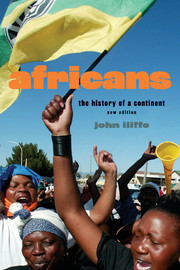Book contents
- Frontmatter
- Contents
- List of maps
- Preface to the second edition
- Africans
- 1 The frontiersmen of mankind
- 2 The emergence of food-producing communities
- 3 The impact of metals
- 4 Christianity and Islam
- 5 Colonising society in western Africa
- 6 Colonising society in eastern and southern Africa
- 7 The Atlantic slave trade
- 8 Regional diversity in the nineteenth century
- 9 Colonial invasion
- 10 Colonial change, 1918–1950
- 11 Independent Africa, 1950–1980
- 12 Industrialisation and race in South Africa, 1886–1994
- 13 In the time of AIDS
- Notes
- Further reading
- Index
- Books in the series
3 - The impact of metals
- Frontmatter
- Contents
- List of maps
- Preface to the second edition
- Africans
- 1 The frontiersmen of mankind
- 2 The emergence of food-producing communities
- 3 The impact of metals
- 4 Christianity and Islam
- 5 Colonising society in western Africa
- 6 Colonising society in eastern and southern Africa
- 7 The Atlantic slave trade
- 8 Regional diversity in the nineteenth century
- 9 Colonial invasion
- 10 Colonial change, 1918–1950
- 11 Independent Africa, 1950–1980
- 12 Industrialisation and race in South Africa, 1886–1994
- 13 In the time of AIDS
- Notes
- Further reading
- Index
- Books in the series
Summary
EGYPT
stone-using peoples had pioneered the colonisation of africa. Their successors carried it forward with the aid of metals: first copper and bronze, then iron. Only northern Africa had a bronze age; agriculturalists used iron to colonise most of eastern and southern Africa.
The earliest evidence of metalworking in Africa comes from southern Egypt late in the fifth millennium bc. At first pure natural copper was probably used to make pins, piercing instruments, and other small articles. Smelting of copper ore to remove impurities probably began in the first half of the fourth millennium, either invented locally or imported from western Asia. It caused no discontinuity in Egyptian history, for stone tools were widely used until the first millennium bc, but the new technique spread until a fixed weight of copper became Egypt's standard unit of value. Moreover, the innovation coincided closely with the creation of Africa's first great agricultural civilisation in the Nile Valley. It was an African civilisation, for Egypt's peoples, although heterogeneous, contained a core of Afro-Mediterranean race and spoke an Afroasiatic language. Egyptian civilisation displayed many cultural and political patterns later to appear elsewhere in the continent, although Egypt also illuminated wider African history by means of contrast.
The contrast was rooted in the environment. Pioneers had practised agriculture in the Fayum depression and on the southwestern edge of the Nile Delta since about 5200 bc.
- Type
- Chapter
- Information
- AfricansThe History of a Continent, pp. 17 - 36Publisher: Cambridge University PressPrint publication year: 2007



